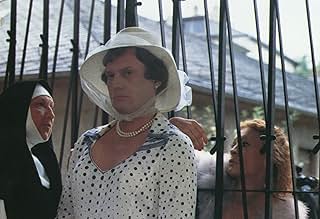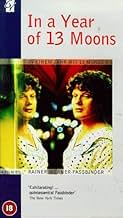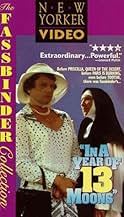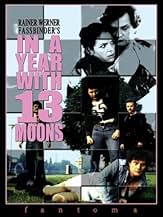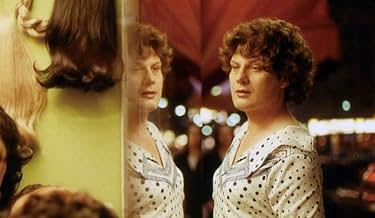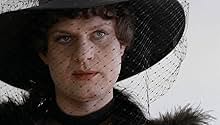CALIFICACIÓN DE IMDb
7.3/10
5 k
TU CALIFICACIÓN
Crónica de los últimos días en la vida de un transexual que abandona a su familia para cambiar de sexo.Crónica de los últimos días en la vida de un transexual que abandona a su familia para cambiar de sexo.Crónica de los últimos días en la vida de un transexual que abandona a su familia para cambiar de sexo.
- Dirección
- Guionista
- Elenco
- Premios
- 1 premio ganado en total
Lilo Pempeit
- Schwester Gudrun
- (as Lieselotte Pempeit)
Janez Bermez
- Oskar Pleitgen
- (sin créditos)
Rainer Werner Fassbinder
- Self
- (material de archivo)
- (sin créditos)
Günther Holzapfel
- Angestellter H. H. Brei
- (sin créditos)
Ursula Lillig
- Putzfrau
- (sin créditos)
Augusto Pinochet
- Self
- (material de archivo)
- (sin créditos)
- Dirección
- Guionista
- Todo el elenco y el equipo
- Producción, taquilla y más en IMDbPro
Opiniones destacadas
Many, if not all of Fassbinder's films focus on weighty, emotional issues and characters plunged into personal despair, but none more so than the torturous and overpowering melodrama of In a Year of 13 Moons (1978). Here, Fassbinder created a film that is completely miserable in both tone and content from the first frame until the last; with the director taking the personal loss over the suicide of his lover Armin Meier and turning it into a suffocating chamber piece of pain and humiliation. Like his earlier masterpiece, Fox and his Friends (1975), the film focuses on the personal exploitation and persecution of a sensitive character at the hands of the people that he loves, as he finds himself cast against a cruel backdrop of the grimy and oppressive homosexual sub-culture of 1970's Frankfurt. However, unlike Fox and his Friends, the spirit of Meier's death and the guilt that we assume Fassbinder was suffering from at the time of the film's conception have here removed any prevailing notion of hope or the promise of escape that hung-over the character of Franz - the lottery winning carnival worker from the aforementioned "Fox", as he sought an end to his cruel suffering - and replaced it with a continually degrading emphasis on shame and deprivation.
Fassbinder establishes the pitiless tone of the film right from the start, with an opening vignette showing our central character, dowdy transsexual Elvira Weishaupt, dressed as a man and wandering through a park in the early hours of the morning looking for trade. After successfully managing to hook-up with a suitably butch male-prostitute, her secret is soon discovered and the 'john', alongside a couple of similarly macho friends, beat and mock Elvira, leaving her as a shivering, crying wreck, half-naked on an disused train-track. From here, Elvira limps home to her cramped apartment only to be plunged into a torturous, violent argument with her ex-boyfriend, which again, leaves her used and humiliated. The film continues in this episodic approach as we follow Elvira over the course of a few days and eventually find out more about her true character and personality and the events in her life that led to the eventual creation of the person that she is when we first discover her. These events are no less cruel and humiliating to the character of Elvira - who has clearly made a number of mistakes, either as a result of naiveté, arrogance or blind stupidity - as we discover the process that turned a handsome young man with a wife and infant daughter into an overweight, alcoholic wreck, abused and betrayed by the various men in her life, and the social pariahs that hang on the periphery.
As ever with Fassbinder, the presentation of the film underpins the feelings of the character and the world that she inhabits perfectly; with the cramped spaces of her apartment made even more prison-like and oppressive by the director's claustrophobic use of staging, design and composition. Fassbinder undertook the role of cinematographer himself here and shot the film on grainy 16mm, which again, adds to the stark and colourless feeling that the film conveys. The ugliness of the cinematography, with its dimly lit rooms, fragment composition and awkward camera movements could be seen as either amateurish on the part of the filmmaker, or as a deliberate attempt to distance the viewer from the characters and the emotional subtext in a manner that is reminiscent of Brecht; or, more appropriately, Godard's cinematic appropriation of Brecht and his theatre of alienation. As with the subsequent political satire, The Third Generation (1979) - once again, shot by Fassbinder himself - the unconventional approach to cinematography is combined with further elements that attempt to similarly disarm us and make the process of viewing the film as difficult as possible. The opening scene itself is emblematic of this approach, with Fassbinder obscuring the frame with large titles and an opening text that scrolls slowly over the entire frame before continuing with his use of obscured images and fragmented mise-en-scene.
Fassbinder also uses jarring cuts, with scenes seemingly beginning during the middle of a conversation or after the context of the scene has already been established, whilst sound and the disorientating way in which the director has characters talking over one another while music plays disconcertingly in the background all continue this idea of deconstruction and emotional distraction. The ugliness of the film fits perfectly with its tone; with the legendary scene in which Elvira and her friend wander ghost-like through an actual slaughterhouse, where cows are dispatched in graphic detail, whilst a monologue is recited to give us the entire back-story of this truly tragic figure. Whether or not Elvira is an extension of Fassbinder or the personification of Armin Meier is unknown, though there is certainly that element to the interpretation. I'd imagine that there is also some of the director in the portrayal of manipulative antagonist Anton Saitz, who recalls the depiction of Fassbinder in the director's own segment of Germany in Autumn (1978). Regardless, In a Year of 13 Moons is a fascinating if entirely difficult work from Fassbinder; one that brims with an uncomfortable feeling of personal confession and searing self examination that is grotesque, repellent and utterly draining, whilst also standing as a powerful and passionately realised piece of work that is both remarkable and affecting.
Fassbinder establishes the pitiless tone of the film right from the start, with an opening vignette showing our central character, dowdy transsexual Elvira Weishaupt, dressed as a man and wandering through a park in the early hours of the morning looking for trade. After successfully managing to hook-up with a suitably butch male-prostitute, her secret is soon discovered and the 'john', alongside a couple of similarly macho friends, beat and mock Elvira, leaving her as a shivering, crying wreck, half-naked on an disused train-track. From here, Elvira limps home to her cramped apartment only to be plunged into a torturous, violent argument with her ex-boyfriend, which again, leaves her used and humiliated. The film continues in this episodic approach as we follow Elvira over the course of a few days and eventually find out more about her true character and personality and the events in her life that led to the eventual creation of the person that she is when we first discover her. These events are no less cruel and humiliating to the character of Elvira - who has clearly made a number of mistakes, either as a result of naiveté, arrogance or blind stupidity - as we discover the process that turned a handsome young man with a wife and infant daughter into an overweight, alcoholic wreck, abused and betrayed by the various men in her life, and the social pariahs that hang on the periphery.
As ever with Fassbinder, the presentation of the film underpins the feelings of the character and the world that she inhabits perfectly; with the cramped spaces of her apartment made even more prison-like and oppressive by the director's claustrophobic use of staging, design and composition. Fassbinder undertook the role of cinematographer himself here and shot the film on grainy 16mm, which again, adds to the stark and colourless feeling that the film conveys. The ugliness of the cinematography, with its dimly lit rooms, fragment composition and awkward camera movements could be seen as either amateurish on the part of the filmmaker, or as a deliberate attempt to distance the viewer from the characters and the emotional subtext in a manner that is reminiscent of Brecht; or, more appropriately, Godard's cinematic appropriation of Brecht and his theatre of alienation. As with the subsequent political satire, The Third Generation (1979) - once again, shot by Fassbinder himself - the unconventional approach to cinematography is combined with further elements that attempt to similarly disarm us and make the process of viewing the film as difficult as possible. The opening scene itself is emblematic of this approach, with Fassbinder obscuring the frame with large titles and an opening text that scrolls slowly over the entire frame before continuing with his use of obscured images and fragmented mise-en-scene.
Fassbinder also uses jarring cuts, with scenes seemingly beginning during the middle of a conversation or after the context of the scene has already been established, whilst sound and the disorientating way in which the director has characters talking over one another while music plays disconcertingly in the background all continue this idea of deconstruction and emotional distraction. The ugliness of the film fits perfectly with its tone; with the legendary scene in which Elvira and her friend wander ghost-like through an actual slaughterhouse, where cows are dispatched in graphic detail, whilst a monologue is recited to give us the entire back-story of this truly tragic figure. Whether or not Elvira is an extension of Fassbinder or the personification of Armin Meier is unknown, though there is certainly that element to the interpretation. I'd imagine that there is also some of the director in the portrayal of manipulative antagonist Anton Saitz, who recalls the depiction of Fassbinder in the director's own segment of Germany in Autumn (1978). Regardless, In a Year of 13 Moons is a fascinating if entirely difficult work from Fassbinder; one that brims with an uncomfortable feeling of personal confession and searing self examination that is grotesque, repellent and utterly draining, whilst also standing as a powerful and passionately realised piece of work that is both remarkable and affecting.
First of all, I would not call this a trans-or LGBT-themed film. Elvira, the main character, may have had trans surgery, but the plot makes it clear that they aren't a trans woman, that they made a mistake having the surgery. But it's also clear that the main character isn't a man, either-they are a person with a lack of identity. So it's a mistake to classify this one with the stories of trans men and women, it's about something very different.
Elvira's lack of identity surfaces in the fact that they can't remember their childhood at all, and when they search for details on it, the results are even more frustratingly ambiguous. They think that loving someone else gives them an identity, and it is this part of falling in love that they love the most-not so much being with another human being, but what it turns them into. That's why they undergo the surgery-because they think it will make them something when they are starting out as nothing. The surgery is just another turn of the screw for them-just another way of groping for an identity that isn't there. It's a much bleaker and more existential story than any trans-themed film I've ever seen.
The film leaves us with more questions than answers, which is how it should be. The characters speak in long monologues that raise lots of questions but no answers. They're more riddles than statements, and it's maddening. Maddening because the more Elvira searches for answers, the more they slip away from them. It's like a horrible taunt for Elvira, and we, in the audience, are not spared one moment of the terrible ambiguity of it all. Fassbinder's compositions add to the confusion, showing us a world that is as unclear to us as it is to Elvira.
For anyone going into this film looking for an LGBT story, you will be disappointed, as you will be if you like a story with a solid resolution. But for those who tolerate ambiguity and frustration-and, indeed, see how they can be virtues in art-you may well be dazzled and hypnotized.
Elvira's lack of identity surfaces in the fact that they can't remember their childhood at all, and when they search for details on it, the results are even more frustratingly ambiguous. They think that loving someone else gives them an identity, and it is this part of falling in love that they love the most-not so much being with another human being, but what it turns them into. That's why they undergo the surgery-because they think it will make them something when they are starting out as nothing. The surgery is just another turn of the screw for them-just another way of groping for an identity that isn't there. It's a much bleaker and more existential story than any trans-themed film I've ever seen.
The film leaves us with more questions than answers, which is how it should be. The characters speak in long monologues that raise lots of questions but no answers. They're more riddles than statements, and it's maddening. Maddening because the more Elvira searches for answers, the more they slip away from them. It's like a horrible taunt for Elvira, and we, in the audience, are not spared one moment of the terrible ambiguity of it all. Fassbinder's compositions add to the confusion, showing us a world that is as unclear to us as it is to Elvira.
For anyone going into this film looking for an LGBT story, you will be disappointed, as you will be if you like a story with a solid resolution. But for those who tolerate ambiguity and frustration-and, indeed, see how they can be virtues in art-you may well be dazzled and hypnotized.
As some others have written or implied this film is absolutely exhausting. It doesn't abandon its character or his life at any time although at times we almost WANT relief. Mahler's music in films has been dutifully noted. It can be almost as depressing in concert version. As for Nino Rota's "happy" music, or "life just continues (joyfully)" score, the irony isn't lost either. This is a one-man job and therefore takes risks that few producers or companies would tolerate under normal circumstances. I was profoundly moved by the film; I just don't plan to see it again for a while.
Curtis Stotlar
Curtis Stotlar
"In a Year of 13 Moons" is a harrowing and brutal film that explores the themes of identity, human suffering and despair. Fassbinder's films, for the most part, are penetrating glimpses into the human condition at its most vulnerable. I really adore Ingmar Bergman's films, but they are considered "too pessimistic or depressing" for some, but my goodness, Rainer Werner Fassbinder's are bleak as night, often set in an unforgiving, cold and unreceptive world.
The film follows Elvira Weishaupt (Volker Spengler), a troubled and struggling transgender woman, who is wrestling with her identity. Fassbinder would construct the film through a non-linear narrative, that intertwines her many painful memories, her personal encounters, and the many philosophical thoughts and reflections on her life. Considered by many to be one of Fassbinder's most challenging and deeply personal films, and for good reason too. Fassbinder would make "In a Year of 13 Moons" in response to the suicide of his close lover, and this grief added to the intense and turbulent atmosphere that the film carries. The themes of rejection and despair are strong themes that drive the film, along with the search for love, and the pain and devastation of its absence. One of my favorite directors, Richard Linklater, would regard it as his favorite Fassbinder film. It is claustrophobic and very depressing, but for people who enjoy character driven dramas, then you may appreciate it.
The film follows Elvira Weishaupt (Volker Spengler), a troubled and struggling transgender woman, who is wrestling with her identity. Fassbinder would construct the film through a non-linear narrative, that intertwines her many painful memories, her personal encounters, and the many philosophical thoughts and reflections on her life. Considered by many to be one of Fassbinder's most challenging and deeply personal films, and for good reason too. Fassbinder would make "In a Year of 13 Moons" in response to the suicide of his close lover, and this grief added to the intense and turbulent atmosphere that the film carries. The themes of rejection and despair are strong themes that drive the film, along with the search for love, and the pain and devastation of its absence. One of my favorite directors, Richard Linklater, would regard it as his favorite Fassbinder film. It is claustrophobic and very depressing, but for people who enjoy character driven dramas, then you may appreciate it.
Fassbinder's genius is making you feel as trapped and desperate as Elvira, you really feel empathy for the character. Only the visit with her family is there a brief respite from her pain. Kudos for Fassbinder for his good taste in using Suicide's "Frankie Teardrop" on the soundtrack--a song about a man who feels trapped, but directs his anger outward, rather than inward, like Elvira.
¿Sabías que…?
- TriviaThe tape-recorded narration heard throughout the film (particularly during the final scene) was not scripted. Volker Spengler (playing Elvira Weishaupt) and Rainer Werner Fassbinder recorded the narration together, with Fassbinder asking questions and Spengler responding in character. In the final cut of the film, Fassbinder's voice is edited out.
- Bandas sonorasSchöner fremder Mann
Music and Words by Athena Hosey and Hal Gordon and German lyrics by Camillo Felgen
Performed by Connie Francis
Selecciones populares
Inicia sesión para calificar y agrega a la lista de videos para obtener recomendaciones personalizadas
- How long is In a Year with 13 Moons?Con tecnología de Alexa
Detalles
- Fecha de lanzamiento
- País de origen
- Idioma
- También se conoce como
- In a Year with 13 Moons
- Locaciones de filmación
- Productoras
- Ver más créditos de la compañía en IMDbPro
Taquilla
- Presupuesto
- DEM 700,000 (estimado)
- Tiempo de ejecución2 horas 4 minutos
- Mezcla de sonido
- Relación de aspecto
- 1.66 : 1
Contribuir a esta página
Sugiere una edición o agrega el contenido que falta

